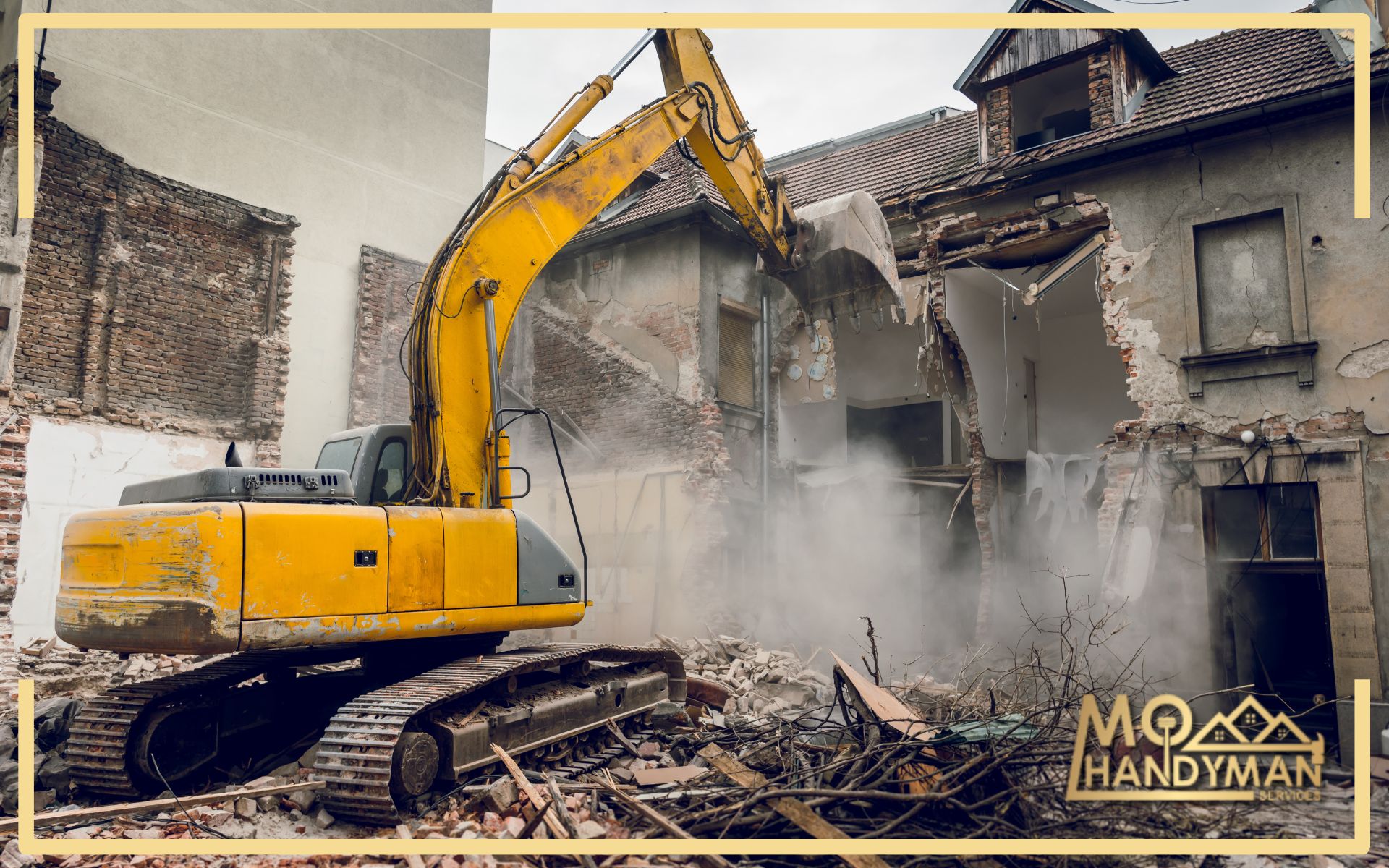Understanding Demolition Services: A Comprehensive Guide
When it comes to demolishing a structure, choosing the right service is crucial. It’s not just about tearing down buildings. It involves careful planning and execution to ensure safety and efficiency. Selecting the right demolition contractors is the first step towards a successful project. These professionals have the expertise to manage the process smoothly. They use advanced techniques to dismantle structures safely and efficiently. Whether it’s a house demolition or building demolition, they handle every project with precision.
For residential demolition, it’s important to choose experts who specialize in demolishing homes. They understand the nuances of working in residential areas. This includes minimizing noise and ensuring the safety of the surrounding properties. Similarly, commercial demolition requires contractors with experience in larger projects. They must manage the demolition of commercial buildings without disrupting nearby businesses.
Safety is paramount in demolition operations. Contractors must adhere to strict safety requirements. This includes wearing protective gear and securing the site. They also need to have plans in place for dealing with hazardous materials. Efficient demolition methods are essential for completing projects on time. This includes using the right tools and techniques to bring down structures quickly and cleanly.
For those looking to hire local demolition experts, it’s beneficial to choose companies with a good reputation in the community. They should have positive reviews and a track record of completing projects safely and efficiently. To learn more about residential demolition services, visit MoHandyman’s Residential Services.
Safety First: Navigating the Hazards of Demolition
In any demolition operation, prioritizing safety is non-negotiable. Hence, understanding the safety requirements becomes a cornerstone of the demolition process. These regulations are designed to protect workers and the public from potential hazards. For instance, demolition services must conduct thorough risk assessments before beginning any project. Additionally, implementing fall protection measures and securing loose materials can prevent accidents.
Moreover, employing safe demolition practices involves regular training for workers. This training covers the correct use of equipment and emergency procedures. It’s also essential for demolition companies to communicate safety protocols clearly to their team. Furthermore, adhering to local and federal safety standards ensures that the demolition process respects legal requirements.
Equally important, efficient demolition methods contribute to the overall safety and speed of the project. Techniques such as implosion, selective demolition, and the use of high-reach excavators allow for precise and controlled demolition. Consequently, these methods minimize the risk of unintended damage to surrounding properties and reduce the project’s environmental impact.
Choosing demolition contractors who prioritize safety is crucial. These professionals should have a solid safety record and use the latest technology to enhance safety measures. They understand that preparation and caution are key to preventing accidents and ensuring a smooth demolition process.
As you consider demolition companies near you, focus on those committed to safety and efficiency. Their approach to managing risks and their adherence to safety regulations will significantly influence the success of your demolition project.
Choosing the Right Demolition Company: Key Considerations
Selecting a demolition company that meets your needs requires careful consideration. Firstly, experience matters. Look for companies with a proven track record in both residential and commercial demolition. Their portfolio should showcase diverse projects, highlighting their capability to handle various demolition challenges.
Secondly, reputation is pivotal. A company recommended by others for its professionalism and reliability often indicates a commitment to customer satisfaction. Online reviews and testimonials can provide insights into their work ethic and the quality of their services. Furthermore, responsiveness to inquiries and concerns reflects their customer service standards.
Moreover, licensing and insurance are non-negotiable. A reputable demolition service will have all necessary permits and insurance to protect you against liabilities. This includes workers’ compensation and property damage insurance. It’s also wise to verify their compliance with local and national safety regulations.
In addition, consider their approach to environmental sustainability. Top-notch demolition companies near me prioritize recycling and the responsible disposal of materials. They employ efficient demolition methods to minimize waste and environmental impact.
For an in-depth guide on selecting the right demolition contractors, consider exploring external resources. This article offers valuable tips for choosing the right demolition contractors, emphasizing the importance of expertise, safety, and customer service.
In essence, the right demolition company is not just about demolition services; it’s about ensuring safety, efficiency, and environmental responsibility. By focusing on these key aspects, you can make an informed decision that aligns with your project’s goals.
Exploring Demolition Methods: Efficiency and Precision
Demolition is not a one-size-fits-all process. Instead, it involves choosing from multiple methods, each suited to specific types of structures and project goals. The three primary methods of demolition are mechanical demolition, implosion, and deconstruction.
Firstly, mechanical demolition is the most common method, utilizing heavy machinery like excavators and bulldozers. This method is preferred for its speed and cost-effectiveness. It’s ideal for residential demolition or smaller commercial buildings. However, it requires skilled operators to manage the machinery safely and efficiently.
Secondly, implosion is a specialized technique that involves using explosives to collapse a building inward. It’s suited for large structures in urban areas where mechanical demolition might be impractical. This method demands extensive planning and precision to ensure the safety of surrounding areas. It’s fascinating how experts calculate the exact amount of explosives needed for a controlled collapse.
Lastly, deconstruction, or selective demolition, focuses on dismantling buildings piece by piece to salvage materials for reuse or recycling. Although it’s the most time-consuming and labor-intensive method, it’s the most environmentally friendly. It reduces waste and conserves resources, making it an excellent choice for projects with sustainability goals.
Each method has its advantages and is chosen based on factors like the building’s location, size, and the project’s environmental considerations. For instance, efficient demolition methods not only ensure the project’s swift completion but also minimize its impact on the surrounding community and environment.
Understanding these methods allows for a more informed decision when consulting with local demolition experts. They can provide insights into the most suitable approach for your specific project, balancing efficiency with safety and environmental responsibility.
Critical Aspects in Building Demolition: Planning and Execution
Demolishing an existing building demands meticulous planning and consideration of several critical aspects. Understanding these can significantly impact the project’s safety, efficiency, and compliance with regulatory requirements.
Firstly, structural assessment is paramount. Before any demolition activity, a thorough examination of the building’s structure is necessary. This assessment identifies potential hazards, the materials involved, and the best demolition method to employ. It ensures the safety of workers and the public, preventing unforeseen complications during the demolition process.
Environmental considerations also play a crucial role. Demolition projects must evaluate the potential impact on the surrounding environment. This includes managing hazardous materials, such as asbestos or lead, which require specialized handling and disposal. Additionally, strategies for dust control and noise reduction are essential to minimize disruption to nearby residents and businesses.
Moreover, regulatory compliance cannot be overlooked. Demolition projects must adhere to local, state, and federal regulations. Obtaining the necessary permits is a critical step that ensures the project proceeds legally. It includes meeting safety standards and environmental guidelines, which safeguard community health and the environment.
Waste management and recycling are also vital components. A responsible approach involves sorting materials for recycling and proper disposal of waste. This not only supports environmental sustainability but can also reduce project costs. For detailed insights on managing demolition projects responsibly, explore MoHandyman’s Residential Services.
Finally, community communication is essential. Keeping the community informed about the project’s timeline, potential noise, and dust can help mitigate concerns. It fosters a positive relationship between the demolition project and the community it affects.
In summary, the demolition of an existing building involves much more than tearing down structures. It requires a comprehensive approach that considers structural integrity, environmental impact, regulatory compliance, waste management, and community engagement. By addressing these aspects, demolition projects can proceed smoothly, ensuring safety, efficiency, and sustainability.
Final Considerations for Demolition Projects
Before embarking on the demolition of an existing building, several critical aspects must be considered to ensure the process is conducted safely, efficiently, and responsibly. Understanding the structural integrity of the building is paramount. It influences the choice of demolition method, ensuring the safety of workers and the surrounding community. Additionally, assessing the presence of hazardous materials like asbestos or lead is crucial. These substances require specialized handling to avoid health risks.
Moreover, obtaining the necessary permits is a step that cannot be overlooked. It ensures the demolition operation complies with local regulations and standards. Engaging with local authorities early in the planning process can streamline approvals and prevent delays.
Environmental considerations also play a significant role. Implementing strategies to minimize dust, noise, and vibration protects the community and the environment. Furthermore, planning for the recycling and disposal of demolition waste promotes sustainability and reduces the project’s environmental footprint.
Lastly, clear communication with the demolition team about expectations and project goals ensures alignment. Establishing a detailed plan, including timelines and safety protocols, sets the foundation for a successful demolition project.
In conclusion, careful planning and consideration of these aspects can lead to the efficient and safe demolition of buildings, paving the way for new developments.







